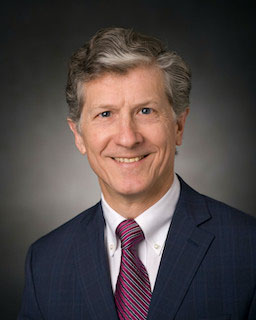Engineering associate dean receives lifetime achievement award
1/23/2020
By Tessa M. Woodring
UNIVERSITY PARK, Pa. — SPIE, the international society for optics and photonics, has named George Lesieutre, associate dean for research and graduate programs and professor of aerospace engineering in the Penn State College of Engineering, the recipient of the 2020 SPIE Smart Structures and Materials (SSM) Lifetime Achievement Award. Lesieutre will be honored at the 2020 Smart Structures + Nondestructive Evaluation Conference on April 27 in Anaheim, California.
“George has made significant contributions in the field of smart structures and materials, as well as to Penn State,” said Justin Schwartz, Harold and Inge Marcus Dean of Engineering. “He is highly deserving of this honor, and I look forward to his continued contributions to both the field and the University.”
The SPIE SSM Lifetime Achievement Award recognizes a senior researcher who has made substantial contributions to the field of smart structures and materials and who has been influential in the growth of the field.
“It’s extremely gratifying to be recognized and appreciated by a technical community that has been a very important part of my life, especially for contributions I made mainly before I became head of aerospace engineering in 2004,” Lesieutre said. “The list of previous winners includes some people I admire very much.”
Lesieutre was nominated for this award by Amy Pritchett, the current head of aerospace engineering at Penn State, who noted his “developments in a breadth of adaptive structures technologies and applications to flight structures” in the nomination letter she wrote.
“George is so modest to talk to in person that I am still learning the wide reach of his research,” Pritchett said. “His work has been used by NASA to improve gas turbine blades; by industry to harvest energy within piezoelectric structures and wireless sensor networks; and by DARPA and the military to actively reshape the structures on aircraft so that the same aircraft can work well in different flight conditions.”
When conducting research in the SSM field, Lesieutre looks at how smart or adaptive structures can exploit the behavior of special transducer materials and tailored electrical circuits to improve the performance of the structure.
Over the past 25 years, Lesieutre’s research has specifically contributed to insights in and the development of smart structures and materials that can harvest energy, control vibration and help manage other aspects of flight.
In addition to his contributions to the SSM field, Lesieutre has also served as a principal investigator of several major projects, organized and served as chair of many conferences and received five society annual-best-paper awards.
Lesieutre also has contributed to SPIE. From 1997 to 2006, he served on the program committees for the Smart Structures and Integrated Systems Conference and the Damping and Isolation Conference. He has also presented more than 30 SSM papers at these SPIE meetings.
According to Lesieutre, Penn State has provided him with the opportunity to work with faculty members and students that have helped him in his journey to success in the SSM field.
“Penn State has been a wonderful place to be a faculty member,” Lesieutre said. “Notably, it’s been easy to collaborate with faculty members and students from other disciplines, which is essential in adaptive structures. We’ve generated some interesting research ideas at the interfaces, learned a lot from each other and had a lot of fun. And it’s great working with students who, before they graduate and move on, are also teaching you new things.”
Beyond his contributions to Penn State and SPIE, Lesieutre also has worked extensively with other professional organizations. He was a founding member of the Adaptive Structures Technical Committee of the American Institute of Aeronautics and Astronautics (AIAA) and a fellow of AIAA. He organized the first AIAA Adaptive Structures Short Course in 2000 and ran it for many years. He also contributed to the organization of several international conferences related to smart structures technology and adaptive structures, hosting one at Penn State in 2010. Most recently, he served as the general chair for the AIAA Science and Technology Forum, SciTech 2015, the world’s largest aerospace-focused conference.
Lesieutre is also a member of the American Society of Mechanical Engineers (ASME), the Association for the Advancement of Science (AAAS) and the American Society for Engineering Education (ASEE).
He earned his bachelor’s degree in aeronautics and astronautics from the Massachusetts Institute of Technology and his doctorate in aerospace engineering from the University of California, Los Angeles.
Lesieutre came to Penn State from the southern California aerospace industry in 1989 as assistant professor of aerospace engineering. He became head of the aerospace engineering department in 2004 and was named associate dean for research and graduate programs in 2016.




